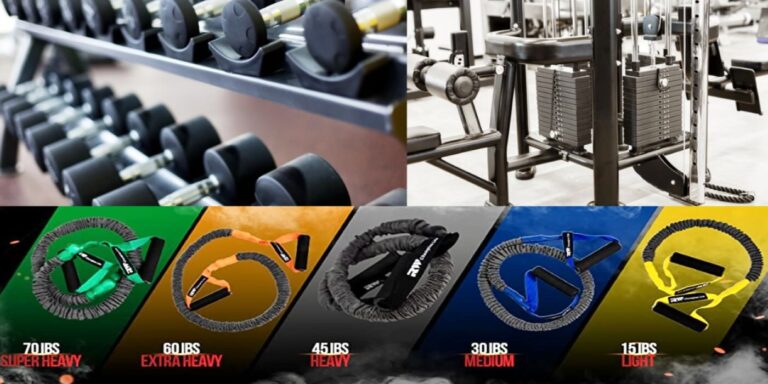 When it’s time to compete, “Some people like to slap themselves on the chest to get hyped and some bang their heads on lockers,” says football player Joshua Haney, son of eight-time Mr. Olympia Lee Haney. “You’ll hear a [foul] word here and there… nothing extreme. There are a lot of different kinds of people with different kinds of ways to get themselves hyped.”
When it’s time to compete, “Some people like to slap themselves on the chest to get hyped and some bang their heads on lockers,” says football player Joshua Haney, son of eight-time Mr. Olympia Lee Haney. “You’ll hear a [foul] word here and there… nothing extreme. There are a lot of different kinds of people with different kinds of ways to get themselves hyped.”
Fierce yelling, snarling mouths, gritting teeth, and grunting under extreme weights… the testosterone zone of a high school weight room can be a formidable place for a teenage boy.
But when it’s properly channeled, a competitive, high-testosterone environment has its place in student athletics. Athletes give their best when they’re striving to win. A responsible coach knows how to harness that drive to succeed and to build up the team without tearing down the young man.
So how do we know when the “do-or-die” model goes too far? What’s safe in terms of weight training? Hold on! Should we even let our kids in the weight room?
CHILDREN AT LARGE
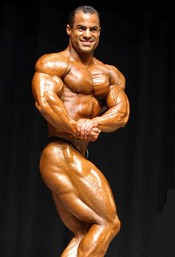 “Today’s youth are the fattest of any preceding generation,” claims father and professional bodybuilder Mark Dugdale. “We need to get the Playstation controller out of their hands and physical activity into their daily lives,” says the 2004 Mr. USA.
“Today’s youth are the fattest of any preceding generation,” claims father and professional bodybuilder Mark Dugdale. “We need to get the Playstation controller out of their hands and physical activity into their daily lives,” says the 2004 Mr. USA.
Research agrees. The annual National Health and Nutrition Examination Survey (NHANES) indicates that about one-third of U.S. children are overweight or at risk of becoming overweight. Sedentary lifestyles and unhealthy food choices can become lifelong partners.
The time to break the cycle is during childhood.
A STRONG CASE FOR STRENGTH TRAINING
Evidence shows that strength training boosts the immune system, improves mood, stabilizes sleep patterns, increases self-confidence, and builds muscle strength. As upper and lower body strength increases, so do an athlete’s flexibility, balance, energy, and stamina increase. Bones get stronger. Even heart and lung functioning get a boost.
Athletic programs incorporate an element of weight training in order to minimize the risk of athletic injuries on the field. Stronger muscles and improved balance lead to fewer injuries and quicker rehabilitation when damage does occur.
Many athletes report increased personal discipline and self-respect as a result of good physical conditioning. For many, weight training offers them a forum for living out their faith through disciplined maintenance of the body God gave them.
SO WHY NOT PUMP IT UP?
If weight lifting truly offers all of these benefits, why isn’t everyone doing it? And why aren’t we establishing these good exercise habits early?
“I think we are never too young to begin regular physical exercises,” says Dugdale. “That said, I don’t believe it’s beneficial for young men to lift extremely heavy weights until they have stopped growing. It makes sense to me that stressing the body with extremely heavy weights is not beneficial for young men.”
Dugdale echoes the concerns of many parents in regard to youth weight training.
Power lifting may damage the growth plates of developing skeletal systems by placing undue stress on these sensitive areas. Experts say bone growth can be affected, even stunting a child’s natural development. Risk increases when proper form is abandoned in order to lift heavier weights.
NO WEIGHT-ING?
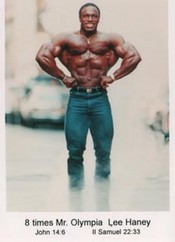 So does that mean that kids should never lift weights?
So does that mean that kids should never lift weights?
Eight-time Mr. Olympia Lee Haney says that’s nonsense. “A structured weight program involves basic form and minimal movement. It’s really not that different from the playground,” he says. “Chin-ups just use body weight for resistance instead of weights. Jumping from a bench to the ground is like doing plyos or squats.
“The play of youngsters is what we’re doing now in the weight room—in a controlled way,” he emphasizes. “It’s important to use an appropriate weight, something the young person is able to control. We don’t want them to be maxed out. They should be able to do at least 10 to 12 repetitions comfortably—nothing strenuous. That keeps the stress off of the joints and ligaments. It’s all about control and balance.”
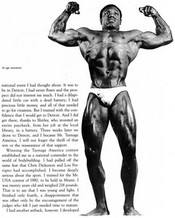
Haney himself began training at age 12 with a “very, very basic” set of York Barbells his parents bought him for Christmas. He learned general exercises for each body part from the Charles Atlas course, a popular manual that was included with the weights.
Years later, with children of his own, Haney encouraged his children to begin supervised weight training early. “My daughter started using barbells at age eight. She was given structure at an early age,” says Haney. Now there are a lot of colleges looking at her, and her father believes her jumpstart in training has a lot to do with it.
“My son Joshua, is the same way,” Haney continues. “He started with 3-pound and 5-pound dumbbells. Now he’s at the Citadel on full scholarship as a wide receiver. Their weight training didn’t stunt their growth. It gave them core strength and balance. Their exercise and athleticism put them ahead of most youngsters in their age group.”
Joshua remembers, “I started training with my dad when I was 11 or 12 years old. He didn’t throw me in there with heavy weights. He brought me along with baby steps. More than anything, I remember he wanted me to get the technique.”
Chris Metzger, Head Football Coach at Pinecrest High School in Pinecrest, North Carolina also advocates the cautious approach. “In the beginning, we have our guys train with just the bar [no weights] to learn the technique. We build excitement and enthusiasm. We try to teach them to be a good partner and get their partner fired up. Then we gradually increase the weight.”
PUBERTY AND BEYOND
Young athletes must have sensible expectations with regard to weight training. Prior to puberty, boys simply don’t have the testosterone levels necessary for building muscle mass. Supervised weight training will increase their core strength and balance. It can even instill personal discipline, but it won’t produce bodybuilder muscles.
The average age for physical maturity is 15 years old. Of course, every child is different. Readiness has more to do with completion of the growing process, testosterone levels, and prior athletic training.
A KILLER BOD
Peer pressure, an ever-present fixture of the teen years, can make boys feel the need to bulk up—and quickly, no matter the cost.
Recklessness leads to irresponsible weight lifting. Caught up in the emotional charge of showing off for the guys or impressing a demanding coach, an athlete can be tempted to lift a weight he’s not ready for. Overuse and back strain can occur from dead-lifts of heavy weights combined with bad form.
Dugdale cautions that responsible choices can prevent injuries. “Adequate warm-up sets, stretching, slow deliberate negative on each movement, using weight that is comfortable based on your abilities, and avoiding locking joints will all minimize the chances of injury.” Using a spotter is also key to weight lifting safety.
While there’s nothing wrong with wanting to maintain a healthy, attractive body, teens can easily fall into the trap of believing that their self-worth is contingent upon their physique.
“People often look to weight training as a way of building confidence and self-esteem,” Dugdale says. “’Self-esteem’ is a politically correct, nice, feel-good way of defining ‘Pride.’ And pride is a sin—the one that got Satan kicked out of Heaven. God created men and women with dignity, value, and worth. We don’t need more confidence or self-esteem. We need more Jesus.”
INSTANT GRATIFICATION AND THE QUICK FIX
Emotional maturity is just as important in weight training as physical maturity. Without self-control, the need for instant gratification can be so strong that teens may look for short-cuts.
For some young men, steroids provide the short-cut. The man-made derivatives of testosterone synthesize protein and help promote muscle growth. Translation: bigger muscles faster. That can be a very tempting thought to an impatient, insecure teenage boy—a boy who has yet to reach the limits of what his own body can do naturally.
Until age 21, the endocrine system is still developing. Using hormones is extremely dangerous. Side effects can be severe, including premature closing of the growth plates (stunted growth), permanent impotence, irregular testicular growth and function, enlarged breasts, baldness, acne, mood swings (known as “Roid Rages”), and liver and kidney problems, including cancer in young people.
 “I tell kids to stay away from them,” Haney says of steroids. “Their bodies are rampant with natural testosterone and natural growth hormones. If anything, their bodies just don’t need the hormones.
“I tell kids to stay away from them,” Haney says of steroids. “Their bodies are rampant with natural testosterone and natural growth hormones. If anything, their bodies just don’t need the hormones.
“That’s what can stunt the growth of a teen,” Haney adds. “Their body starts relying on the synthetic hormone instead of the natural hormones, and then they can’t reach the growth they’d have naturally. They can’t be all they could have been if they’d just let nature take its course.”
Haney notes the difference, however, between steroids and supplements. “Teenage athletes need supplementation, even more so than their parents,” insists Haney. “So much is demanded of them physically that they need that extra supplementation. They should be taking a multivitamin for overall function and a joint supplement, like glucosamine, chrondroitin, and omega fish oils.” But they don’t need steroids. “They just need good, basic, clean nutrition with multivitamins, joint supplements and basic proteins.”
WHERE’S THE BREAKING POINT?
Pushing through physical discomfort is a key part of building stamina and character. But where do we draw the line between ambitious competitive drive and “over the edge?” At what point does “pushing through the pain” become dangerous?
To some degree, the responsibility lies with the coach. His influence will determine the atmosphere of the training room, and his judgment will determine how aggressively the athlete progresses. Responsible supervision is vitally important in weight training.
“I see a lot of negative motivation,” Josh Haney says of some athletic programs. “Tearing down players and just—abusing them, drilling guys until they can’t go anymore… It starts to wear on them.”
His father, Lee Haney, says, “My basic philosophy is ‘Stimulate, not Annihilate.’ You don’t want to endanger the athlete. You want to push, but listen to their bodies. People say, ‘No pain, no gain.’ Well, the pain is there for a reason. It’s a signal to back off, to try the movement in a different way. You’ve got to make adjustments and listen to the body.” He continues, “That’s why professional help is so important in putting together a program. Ad-lib programs can hurt you.”
OLD-SCHOOL VS. NEW-SCHOOL COACHING
“We’ve adopted the YMCA philosophy of Mind-Body-Spirit,” says Coach Metzger. “We want to build the self-esteem of these young men and make them believe they can do the things that other people won’t. We’re very technique-oriented. We [the coaches for our team] share the same philosophy that coaching is a ministry and that we want to train our young men how to do things properly.”
Metzger and his staff have a history of rebuilding struggling football programs. Not long after signing on at Pinecrest, the coaching team instituted an early-morning Breakfast of Champions workout program, involving practice drills and some weight training. “We do that four days a week, Monday through Thursday. During the school year, we train from 6 to 7:30 AM,” says Metzger.
Though expectations for game victories are high, the coaches at Pinecrest are focused on building character at the same time they build a team. The atmosphere during training is uplifting, not degrading.
“We are absolutely not an old-school staff that uses foul language or allows our players to use foul language. During college, my coach didn’t believe you needed to have loud, blaring music during workouts, so we’ve sort of adopted that, too. The kids have really bought into it.
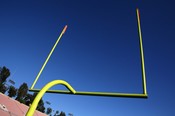 “We teach them to not use those kind of [inappropriate] words, to be on time, that the teacher’s right no matter what they think…. These are skills that teach them to keep their cool when they’re on the field, too,” says Metzger.
“We teach them to not use those kind of [inappropriate] words, to be on time, that the teacher’s right no matter what they think…. These are skills that teach them to keep their cool when they’re on the field, too,” says Metzger.
“We really took them from a ‘Yeah-Nah’ team to teaching them to look someone in the eyes when they’re talking to you. In life, looking someone in the eyes shows you’re paying attention. It shows respect. It shows you care. Good manners aren’t old school; they’re real school.”
KEEPING THE FAITH
How does faith play a role, particularly in public high school athletics?
“First and foremost,” says Metzger, Christian coaching “is not necessarily about working on principles, but in the way you act, the way you carry yourself, they way you coach. Kids see that you walk the walk and talk the talk.
“The FCA [Fellowship of Christian Athletes] is a great program for students and educators. It gives you the platform to invite kids, to foster relationships… and kids get curious when they see you walking the walk,” Metzger claims. “They start asking questions about Christ because of the way they see you live your life.”
A recent FCA rally at Pinecrest hosted more than 150 student athletes. “By that time, we’d had seven weeks of Breakfast of Champions,” says the coach. “I think that instilling that program made them urge other kids to come to the rally.” Thirteen kids committed to following Jesus at that rally.
“Faith is everything in terms of getting beyond physical and mental struggles,” adds Lee Haney. “When we start thinking we can’t win, we remember Psalm 23, ‘The Lord is my shepherd, I shall not be in want.’ But even in losing, there’s peace in giving your very best. First place doesn’t always mean a first place trophy. It can be second or third or fourth, if you’re doing your best.”
Haney’s son Joshua says his faith has helped make him a leader on the field. “It gave me the extra mental strength over all the other competitors who don’t have that. I just think, ‘If someone could die on the cross for me, for my sins, why can’t I run another 500?’”
DAD’S ROLE
 “Dads are of utmost importance,” says Dugdale. “The troubled young men today are the reflection of the lack of time and attention from fathers. Fathers need to take an interest in their sons and go to the gym with them.”
“Dads are of utmost importance,” says Dugdale. “The troubled young men today are the reflection of the lack of time and attention from fathers. Fathers need to take an interest in their sons and go to the gym with them.”
“Dads are heroes to their kids,” declares Haney. “Dads need to encourage their kids in victory and defeat. Don’t beat them down—still make them feel big, not small. Know who their friends are and their friends’ parents. Pray with them, and do what you can to shape their character.
Haney suggests the book Raising a Modern Day Knight by Robert Lewis, “It’s
one of the most incredible books about the role of fathers in developing young men. And, of course, we need to be in the Word of God. The Bible tells us to ‘Raise your children in the way that they should go.’”
Haney remembers when he was six years old. Thinking he was Superman, he decided to throw a boulder over his dad’s car. “It didn’t make it past the back glass,” he laughs. “When my dad heard the glass, he ran out of the house and said, ‘Who did this?’ My dad was a big guy, and I didn’t want to get in trouble, so I told him my 3-year-old brother did it—and he believed me! I always tell people that I did the wrong thing, but what my dad didn’t know then was that it was a Mr. Olympia inside that 6-year-old body! Even at age 6, I knew I wanted to be Samson-Hercules.”
Parents have to focus on loving and accepting their children for who they are and leading them down the path the Lord has for them—a path that gives glory and honor to God.
“Dads should operate as ministers over our families,” says Haney, “especially in the lives of our sons—they’ll be ministers of their own families one day. A good athlete will be a good provider. He’s able to keep up with a challenge and won’t give up. He’ll get out of bed when he doesn’t feel like it.
“A godly man can raise another godly man with strength under control, endurance under control, and perseverance under control,” Haney concludes. “We need to get the job done, but do it in a way that’s pleasing to God.”
Joshua says that Haney got the job done. “My dad stood behind me,” he remembers. “He made sure I had the things I needed to go about doing what I needed to do. He motivated me to keep my spirits up whether good or bad, and he kept me focused when I might get weary.”
Coach Metzger adds that parents can support their child by supporting his coaches. “Treat them with respect,” he says. “That doesn’t mean don’t be enthusiastic, don’t get fired up, but be respectful. If you have a problem, contact the coach. Sit down and talk.”
DROP AND GIVE ME 20 MINUTES
Hitting your knees in prayer may be one of the most important things a parent can do for a child. Experts offer plenty of tips about best practices, but true wisdom comes from spending one-on-one time with God.
Praying with your kids leads them right to the source. It shows them where their priorities should lie, even as it teaches them that their lives are a priority to you.
Dugdale advises athletes to “keep Jesus first, work hard in all aspects of your life and always have a Plan B. Pray that God will make his desires your desires. Then when you pursue your desires, you are actually pursuing his.”
Coach Metzger remembers meeting the parents in Pinecrest, N.C. He says, “I can’t tell you how many people in this community told us, ‘We prayed for you all. We prayed that a team of Christian coaches and their wives would come in here.’ They told me they even walked around the campus praying for us.” It’s that kind of commitment that makes a difference in a team and makes a difference in kids’ lives.
When God is invited into the weight room or onto the athletic field, kids have the opportunity to live out their faith. “In all your ways acknowledge [the Lord] and he will make your paths straight,” says the writer of Proverbs. “We need to acknowledge him on the athletic field as well as off the field,” Haney points out. “I think if we get that one right, we’re doing real good.”
Put your faith on the line:
- The Bible tells us that our bodies are God’s temple, filled with his Holy Spirit. We are to care for them out of respect for God. What are you doing to maintain his temple? Can responsible weight training be part of your child’s exercise routine?
- The body is God’s Temple, but we are to worship God, not the temple. Is your son’s focus on the body a healthy interest in fitness or an obsession that drags his focus away from God?
- What does God expect of a competitor and how can young men honor him in athletics?
- What can you do to help your child’s coach maintain a healthy atmosphere that supports young men and honors God? Do you need to contact his coach to discuss unhealthy, ungodly behaviors? Could you offer him a word of encouragement about how he’s leading the team? Should you pray for him, for your child, and for the team?
- Does your behavior during training sessions and sporting events show that your priorities are in line with God’s word? Are you setting a good example and supporting your child?
1 Corinthians 9:25
Jeremiah 9:23-24
2 Timothy 4:7
Philippians 4:13
Ecclesiastes 9:10
Psalm 23
2 Samuel 22:33
James 1:17
Proverbs 3:5
Readers can learn more about Lee Haney’s eating programs, training programs, and supplements from www.leehaney.com. Visit www.markdugdale.com to learn more about Dugdale’s background, training, and appearances.
 Jodi Knepper is a freelance writer and editor from Reading, Pennsylvania. She is excited to be joining the Faith and Fitness team as the new Family Fitness Editor this month. Jodi and her husband Darren have two young children—their 3- and 6-year-old have not yet begun weight training.
Jodi Knepper is a freelance writer and editor from Reading, Pennsylvania. She is excited to be joining the Faith and Fitness team as the new Family Fitness Editor this month. Jodi and her husband Darren have two young children—their 3- and 6-year-old have not yet begun weight training.Photos courtesy of Mark Dugdale and Lee Haney.


